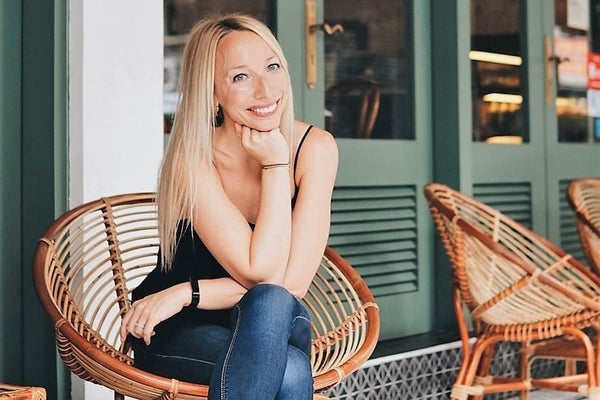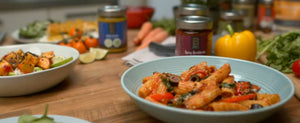
We recently interviewed Health Coach Sophie Bibbs and here is what she had to say!
My name is Sophie Bibbs, and I am a digestive health coach who helps women struggling with IBS and uncomfortable digestive problems to take control of their gut. I work virtually with clients all over the world, so they can take control of their gut from wherever they are. I offer personalised support to work out what’s triggering your problems, and feel better, so you can get on with living your life! I trained with IIN and Monash, the creators of the Low FODMAP Diet.
How long have you suffered with IBS?
It feels like forever, but I’d say I first started noticing it over 15 years ago, when I was about 13. I just remember constantly asking my mum why my stomach was all big and bloated. I didn’t understand it at all. I then suffered with it on and off for years. However, it wasn’t until I moved to Malaysia a few years ago, that I was ‘officially’ diagnosed with IBS, after a bad parasite infection and a round of antibiotics that made my symptoms a lot worse! Whilst I had known I had IBS for years, I was relieved to finally have a diagnosis.
Tell us about training as a health coach specifically for those with IBS
When I finally got ‘diagnosed’, the doctor wrote down ‘Low FODMAP Diet’ on a piece of paper and sent me on my way. I found a dietitian at that hospital who I went to see about doing the diet, but she honestly knew less about it than I did (and I’d done an hour of Googling!). I was a bit cross and upset and felt hopeless, so set myself loose on Google. I found out about Monash University (the creators of the diet) and that you could train with them in the low FODMAP diet. So, I signed up to train in it and I used myself as a test case!
It worked and I was so happy I wanted to share it with the world! However, whilst knowing my food triggers was fantastic, what I found out from putting myself through it was that it was really hard to stay motivated to stick to. I also realised it wasn’t just food triggering my IBS…whilst I’d come a long way, there was still something else going on there.
So, I decided to take it a step further. I didn’t want to just be able to provide all the nutritional information about the low FODMAP diet and send people on their way. I wanted to be able to support them through it and help them out when they got stuck. On top of that, I wanted to help them work out all the other triggers and things that could be influencing their IBS, aside from FODMAPs (things like stress, travel, fatty foods, etc etc). As a result, I trained as an Integrative Nutrition Health Coach at IIN (Institute of Integrative Nutrition) and went on to specialise in gut health.
The low FODMAP diet, and all of the strategies I learned in my health coach training, absolutely changed my life. I finally understood what my IBS triggers were and I was so happy. I know how awful and misunderstood IBS is, after suffering with it for years, and I now just want to help as many people suffering, just like I was, to work out their triggers, take control of their gut and feel so much more confident to live their life!
What’s the one thing you wish you’d known when you were first diagnosed with IBS?
I wish I’d known that I wasn’t alone! It may sound silly, but I always felt like I couldn’t really talk about it openly. I saw doctor after doctor and just got brushed off or told to eat more fibre. I’d have to cancel plans and lie on the sofa, too uncomfortable to move. The worst thing was people thinking I was just being flaky or not really believing I was ill. If I’d known I wasn’t alone and that IBS was so common (nearly 1 in 5 people have it!), I wouldn’t have been so embarrassed. I’d have talked about it more and been open with my friends about why I was cancelling plans.
What are your best tips for dealing with IBS?
Firstly, I’d say talk about it! I know how embarrassing the symptoms of IBS can be. I mean, bloating and toilet habits are not a sexy topic! However, having IBS can make you feel so alone, and being able to talk about it can really change that. Start with someone you feel close to or, if you don’t feel comfortable doing that, use social media to connect with others. Talking to other people about it will make you realise you’re not in it alone and will make it far easier to deal with.
Secondly, I’d recommend investing some time into working out what your triggers are. This was an absolute game changer for me and is for my clients. One of the worst things about IBS is not knowing what’s causing your symptoms and then bashing your head against the wall trying to work out what you did wrong! Knowing what causes your symptoms will take that stress away and give you back so much control. You can then still choose to eat or do those things that you know are triggers, but it will be up to you and you will know why you feel so bad..so you can stop bashing your head against the wall.
How to do this? As a first step, grab my free IBS Triggers Checklist (link at the bottom of this blog). This is a list of 20 things that could be triggering your IBS and working through this in conjunction with a food diary will give you a kick start to figuring out your triggers. Bay’s Kitchen sell a Food Diary which you can get here.
How long have you been on the Low FODMAP Diet?
Despite being called a ‘diet,’ the low FODMAP diet isn’t about restricting your diet long term, which is a common misconception! So, I was on the elimination phase (the first phase of the diet, where you eliminate all high FODMAP foods) of the diet for 4 weeks. I felt so much better, so I then moved onto the re-challenge phase (the second phase of the diet, where you gradually reintroduce the foods in groups so you learn what your triggers are), which took me 8 weeks.
During those 8 weeks, I worked out that I’m really sensitive to onion, garlic and fructose, and mildly sensitive to lactose and wheat. So, I’m now in the third phase of the diet – personalisation. This is my version of the diet that fits around my specific tolerance levels and is sustainable long term. I’ve been following a personalised low FODMAP diet for almost 2 years now!
What common misconceptions have you found about the Low FODMAP Diet?
The most common misconception I hear is what I just mentioned – that the low FODMAP Diet is a long term diet. There are 3 distinct phases to the low FODMAP diet and it’s all about learning what YOUR food triggers and unique tolerance levels are. The aim is to reintroduce as many high FODMAP foods as your gut can handle, so you can eat as healthy and varied a diet as possible. I like to think of it as a ‘learning diet’ – learning about your gut so you can get to the perfect balance between reducing your symptoms and eating healthily.
The second misconception I hear is that it’s a ‘diet.’ We’ve all come to associate that word with losing weight, so people are often put off. I’ve had clients say they were put off by it when they first heard about it because they weren’t interested in losing weight. Calling it a ‘diet’ is quite deceiving as it has absolutely nothing to do with losing weight.
The other key misconception is that foods are either high or low FODMAP and it’s black and white. Whilst it’s great news that the diet is becoming more popular, it also means there are loads of lists flying around the internet with ‘high FODMAP foods’ in one column and ‘low FODMAP foods’ in the other (you know the ones I mean!). When I first looked into the diet, this is what I found, and I assumed I either needed to avoid each food completely or I could safely eat as much of it as I wanted. Well, turned out that wasn’t the case.
One New Year’s Eve, I ate almost a whole plate of zucchini, as it was ‘low FODMAP’ on the list I had, but my stomach was SO bloated afterwards. I was so upset and just couldn’t work out why as I hadn’t eaten anything high FODMAP. When I later discovered that FODMAP portion sizes matter, I realised I’d just had too much of it, and it’s only low FODMAP at 65g! So, the low FODMAP diet isn’t black and white. Each food is high or low FODMAP depending on the portion size of that food. My best advice here is to ditch all those high and low FODMAP food lists, and download the Monash Low FODMAP App. Monash University founded the diet so this is the best place to get the most accurate information on FODMAP content of different foods.
If I was just starting on the diet, what would your top tip be?
I can’t narrow it down to one, so I’m going to give you 3:
1. Get clear on your why
The low FODMAP diet isn’t easy. You’ll definitely come across challenges and setbacks along the way and that’s completely normal. I don’t think I’ve spoken to anyone who hasn’t. That’s why it’s so important to get clear on why you’re doing it. Think about how you’re feeling now and how you want to be feeling and picture that in your head. Write it on a post it and stick it somewhere you’ll see it often! If you aren’t clear on why you’re doing it and the results you want to achieve, then it will be very hard to keep going when you face a challenge.
2. Make the time
It takes 12 weeks minimum to get through the elimination and reintroduction phases of the diet, before working out your personalised low FODMAP diet. So, you need to make sure you’ve got at least 3 months ahead of you where you can really commit to the diet. As with everything, I don’t personally think there’ll ever be a right time. There’s always something that could stop you – a birthday dinner, wedding or holiday. However, maybe starting when you’re going through a particularly stressful time at work or about to get married isn’t the best idea.
3. Get guidance from a FODMAP-trained professional
It’s such a complicated diet, and there are so many nuances to it. It can be really hard to figure out by yourself and you can end up getting really discouraged and it taking you so much longer than it should do. So, get help if you can. Now, there are lots of fabulous health professionals out there who are great at their jobs, but just haven’t trained in the diet, so won’t be much help to you. I’d highly recommend speaking to a dietitian, nutritionist or health coach who has had specific training in the diet. It’s not worth wasting your money speaking with someone who hasn’t. Take it from someone who made that mistake! If you don’t have the money for that right now, at least try to get all the free advice you can from the right people. Follow some FODMAP-trained professionals on social media to pick up free tips or sign up for my free 1 Week Low FODMAP meal plan to help get you started (link at the bottom).
Do you have any secrets or quick wins you could share about cooking on the Low FODMAP Diet?
Ah, when I first started the diet, I was so overwhelmed by cooking and thought I was going to have to cook everything from scratch. I am not a good cook, nor do I enjoy it or have that much time for it, so you can imagine this totally put me off. As I got more and more into it, however, I realised that wasn’t the case and it wasn’t actually that bad. Here are my 3 quick wins for low FODMAP cooking:
1. Quick recipe swaps:
You don’t need to find whole new low FODMAP recipes, believe it or not. When you start the low FODMAP diet, you don’t want to have to get rid of all the recipes you used to cook and start completely from scratch again. You can just take the recipes that you know how to make and that you enjoy eating, and make some simple swaps. All you need to do is identify the high FODMAP ingredients, and swap them for low FODMAP ingredients. There’s a substitute for most of them! Then you’ll still be eating your tasty, nutritious, easy meals, but they’ll also, importantly, be low FODMAP. Win win.
Here are some key high FODMAP ingredients with their low FODMAP alternatives:
| High FODMAP Ingredient | Low FODMAP Alternative |
| Onion, leek | Green tips of spring onions |
| Garlic | Garlic infused olive oil |
| Stock | Home-made stock with low FODMAP ingredients |
| Portobello/button mushrooms | Oyster mushrooms |
| Pasta | Rice, quinoa |
| Noodles | Rice noodles |
| Honey | Maple syrup |
| Cashews, pistachios | Macadamias, pecans, peanuts |
| Wheat flour | Rice flour, sorghum flour |
| Cow’s milk | Almond milk, rice milk, lactose free milk |
| Soy milk (made with soy beans) | Soy milk (made with soy protein) |
| Yoghurt | Lactose free yoghurt, coconut yoghurt |
| Sweet potato, butternut squash | Pumpkin, regular potato |
2. You do not need garlic and onion!
The thing that most people struggle with when it comes to low FODMAP cooking is the lack of garlic and onion. These 2 ingredients seem so crucial for flavour. If you’re anything like me, you’ve got used to using garlic and onion as a base for most meals…pasta, chilli, stir fry, marinades for veggies. However, I quickly realised you can have amazing, flavoursome food, without a speck of garlic or onion in sight. I’m super sensitive to garlic and onion, so I never cook with them any more, and I really don’t miss them at all. I eat really tasty food every day!
Here are some yummy low FODMAP ingredients you can try instead of garlic and onion: herbs (parsley, basil, coriander, thyme, rosemary), spices (cumin, coriander, turmeric, ginger, chilli), Asafetide powder (add a pinch for an onion-like flavour), garlic infused oil, chives, green tips of spring onions, mustard, lemon + lime juice, fresh ginger.
3. Cheat when you can
There are some amazing low FODMAP food companies popping up, offering us quick, ready made low FODMAP meals and sauces (like the lovely Bay’s!). If you can find these where you live, get them and stock up. Having a jar of ready made, low FODMAP sweet and sour sauce in the cupboard that you can chuck on a stir fry when you get home late after a meeting that ran over and a delayed train, can be a life saver.
We loved speaking with Sophie, and she has been so kind to share so much information, checklists and more. If you are interested in contacting her or following her on social, her details are below!
- Website: www.sophiebibbs.com
- Social media: @sophiebibbs
Sophie has also kindly shared a free IBS Triggers checklist and a Free 1 week Low FODMAP Meal Plan for you to download!
- Free IBS Triggers Checklist: list of 20 things that could be triggering your IBS – put an end to the IBS mystery today – https://www.sophiebibbs.com/ibs-triggers-checklist
- FREE 1 Week Low FODMAP Meal Plan: https://www.sophiebibbs.com/mealplan
We hope you enjoyed reading our interview with Sophie. Keep an eye out on our blog and social in the coming weeks as we also spoke to Sophie about travelling whilst on the Low FODMAP Diet!
Interviewed by Bay Burdett, Founder & CEO of Bay’s Kitchen.
Copyright Bay’s Kitchen. Please do not reprint without permission.
Related Articles
How To Restore Balance & Rejuvenate Your Gut Health
Introducing Nutrition & Health Specialists: Uniquely Created U
6 Relaxation Techniques To Ease Your IBS Symptoms
Popup
Use this popup to embed a mailing list sign up form. Alternatively use it as a simple call to action with a link to a product or a page.
Age verification
By clicking enter you are verifying that you are old enough to consume alcohol.




